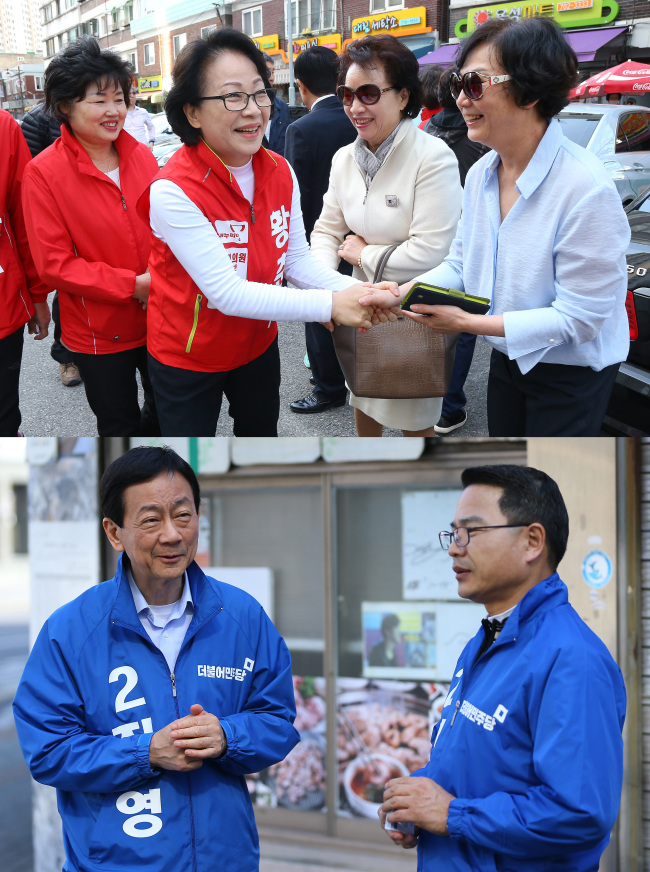Incumbent lawmakers, with their established organizations and understanding of local issues, usually have the upper hand over rookie rivals when challenging for reelection.
But in this year’s parliamentary elections, a significant number of voters are appearing to be aloof toward their current representative, reflecting the growing public cynicism about party politics.
Among the 292 members of the 19th National Assembly, 190 have entered candidacy for the April 13 race, according to the National Election Commission data. Considering those who failed to make it past the party’s preliminary cutoff, the actual number of those who originally sought an additional term is much higher.
 |
| Saenuri Party‘s candidate for Yongsan Hwang Chun-ja (top photo) and former Saenuri member running as The Minjoo Party contender Chin Young are on their campaign trails in the distrit on Monday. (Yonhap) |
Despite their struggle for continuity, however, several ranking candidates have found themselves cold-shouldered by their local voters, who seem to prefer new blood over familiar faces.
An example is former Welfare Minister Rep. Chin Young, who defected last month from the ruling conservative Saenuri Party to join The Minjoo Party of Korea, after failing to win candidacy in his home camp.
Chin was immediately named the main opposition party’s candidate for his current constituency of Yongsan-gu, brushing aside the Minjoo Party’s preliminary candidates.
The senior lawmaker, who had once been one of the closest aides to President Park Geun-hye, received a fervent welcome from party chief Kim Chong-in, but his approval ratings in polls have so far fallen below his new party’s expectations.
According to a survey conducted by Korea Research Center on 500 respondents last week, Chin was ranked second with 31.9 percent of support, lagging behind his Saenuri competitor and political newcomer Hwang Chun-ja. Other surveys by local media, too, showed the ruling-turned-opposition figure to be the runner-up in the regional race.
Observers have pointed out that despite his political career and advantage as a current representative, Chin’s personal reputation was outrun by the residents’ preference for the conservative party.
The central Seoul district, embracing the newly rising rich residential areas in Ichon-dong, has for the past 16 years been classified as a conservative stronghold.
Another lawmaker facing a challenge is Rep. Chung Sye-kyun of the Minjoo Party, a fifth-termer and former party chief who is running for reelection in Jongno-gu, a core constituency in the nation’s capital.
Chung once again marked his position within the opposition camp by achieving a sweeping preliminary victory over a ranking pro-presidential aide. The match was initially considered highly rash, as he had given up an easy win in his longtime electorate in North Jeolla Province, accepting the leadership’s call.
For him, the big hurdle is neither the conflict with the party nor his lack of legislative performance — but the appearance of former Seoul Mayor Oh Se-hoon as his Saenuri rival.
A survey by Realmeter showed Sunday that Chung had 39.9 percent support, falling slightly behind rival Oh’s 41.5 percent.
This gap of 1.6 percentage points was down from a high of 17.3 percentage points in the third week of March. Nevertheless, Chung is proving stiff competition against the widely recognized former mayor, who is also considered a potential presidential candidate.
“True public opinion may be found in the streets, on the faces of the people,” said Chung, shrugging off the poll results.
“Opposition candidates have to fight not only against their rival candidates but also against public pollsters (that often speak in favor of the ruling administration).”
Former Prime Minister Lee Hae-chan, on the other hand, is suffering the consequences of his disgraceful defection from the Minjoo Party.
After the leadership ruled him out of nomination, citing “political reasons,” Lee stormed out of the party and announced his solo candidacy in the administrative city of Sejong.
Having won the first legislative seat in the newborn city back in 2012, Lee displayed confidence in doing the same this year, without a partisan support.
But a recent survey by Research & Research showed the former prime minister to be losing to Saenuri rookie Park Jong-jun, with 30.6 percent versus 35.7 percent.
As for the People‘s Party cochairman Rep. Ahn Cheol-soo, the close chase of Saenuri candidate Lee Jun-seok in Nowon-C constituency is a major threat in keeping his seat in the parliament and promoting the position of his fledgling party.
According to pollster Realmeter, Ahn’s stood at 42.8 percent support earlier this week, still outpacing Lee‘s 31.1 percent.
But observers pointed out that Ahn, as party chief, is allocating most of the campaigning period to supporting other candidates while Lee is focusing on the constituency.
By Bae Hyun-jung (tellme@heraldcorp.com)

